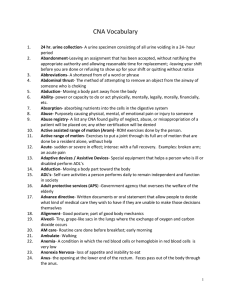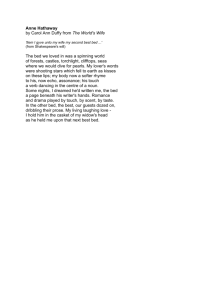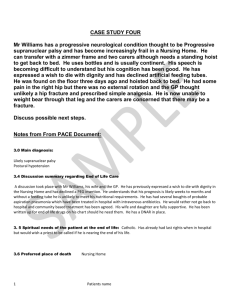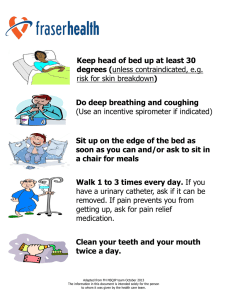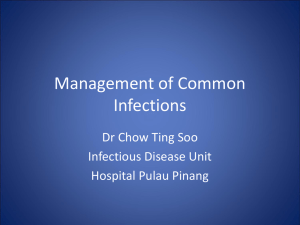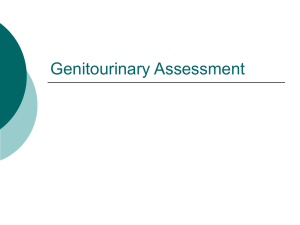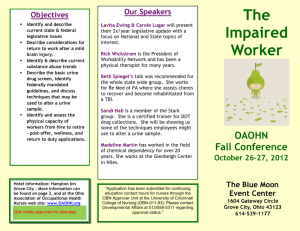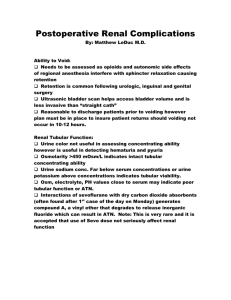CNA Vocabulary
advertisement
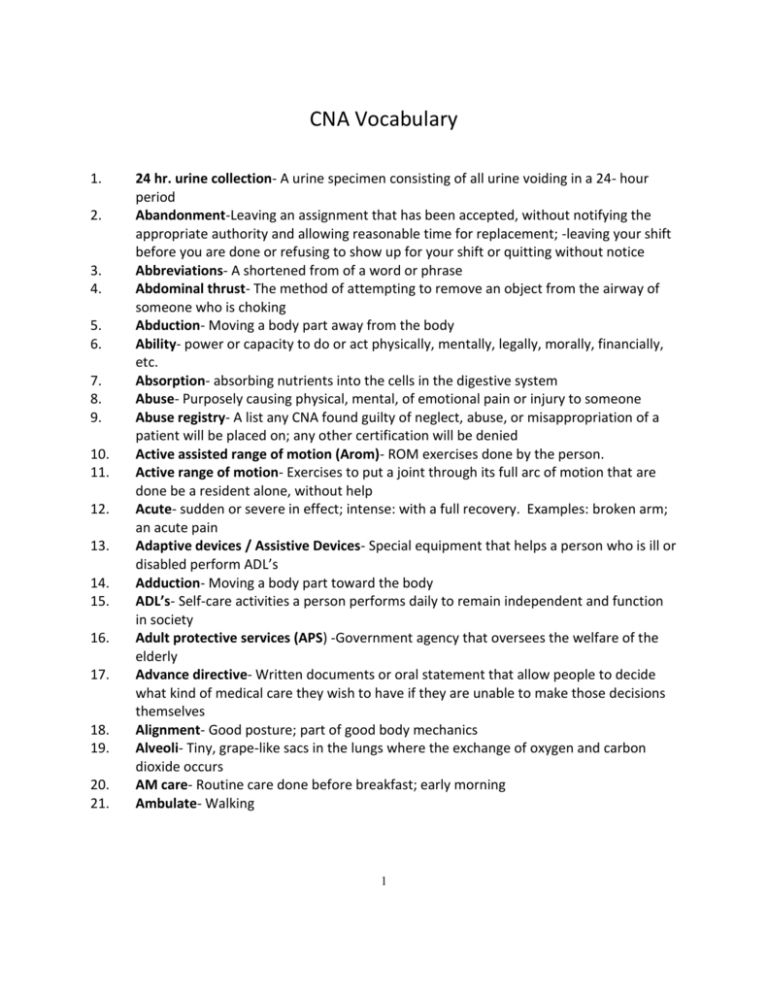
CNA Vocabulary 1. 2. 3. 4. 5. 6. 7. 8. 9. 10. 11. 12. 13. 14. 15. 16. 17. 18. 19. 20. 21. 24 hr. urine collection- A urine specimen consisting of all urine voiding in a 24- hour period Abandonment-Leaving an assignment that has been accepted, without notifying the appropriate authority and allowing reasonable time for replacement; -leaving your shift before you are done or refusing to show up for your shift or quitting without notice Abbreviations- A shortened from of a word or phrase Abdominal thrust- The method of attempting to remove an object from the airway of someone who is choking Abduction- Moving a body part away from the body Ability- power or capacity to do or act physically, mentally, legally, morally, financially, etc. Absorption- absorbing nutrients into the cells in the digestive system Abuse- Purposely causing physical, mental, of emotional pain or injury to someone Abuse registry- A list any CNA found guilty of neglect, abuse, or misappropriation of a patient will be placed on; any other certification will be denied Active assisted range of motion (Arom)- ROM exercises done by the person. Active range of motion- Exercises to put a joint through its full arc of motion that are done be a resident alone, without help Acute- sudden or severe in effect; intense: with a full recovery. Examples: broken arm; an acute pain Adaptive devices / Assistive Devices- Special equipment that helps a person who is ill or disabled perform ADL’s Adduction- Moving a body part toward the body ADL’s- Self-care activities a person performs daily to remain independent and function in society Adult protective services (APS) -Government agency that oversees the welfare of the elderly Advance directive- Written documents or oral statement that allow people to decide what kind of medical care they wish to have if they are unable to make those decisions themselves Alignment- Good posture; part of good body mechanics Alveoli- Tiny, grape-like sacs in the lungs where the exchange of oxygen and carbon dioxide occurs AM care- Routine care done before breakfast; early morning Ambulate- Walking 1 22. 23. 24. 25. 26. 27. 28. 29. 30. 31. 32. 33. 34. 35. 36. 37. 38. 39. 40. 41. 42. Anemia- A condition in which the red blood cells or hemoglobin in red blood cells is very low Anorexia Nervosa- loss of appetite and inability to eat Anus- the opening at the lower end of the rectum. Feces pass out of the body through the anus. Anxiety- a vague, uneasy feeling in response to stress Apical- Bottom of the heart, where the beat is found Apnea- The absence of breathing Artery- Vessels that carry blood away from the heart Asepsis- Producing and maintaining a clean condition; Being free of disease-producing microbes Aspiration- Breathing fluid or food into the lungs Assault- Threatening or threatening to harm or tough a person’s body without the person’s consent. Assisted living- A setting for people who require some help with daily care, but who need less care than a long-term care facility offers. Atrophy- The wasting away, decreasing in size, and weakening of muscles or organs from lack of use Axillary- Related to, or located near the armpit; axillary temperature Bacteria-unicellular microorganisms Base of support- The are on which an object rests Battery- The actual touching of another person without a person’s permission Bed cradle- Bar or box that keep linens off the feet to prevent foot-drop Bed pan- a shallow toilet pan for use by persons confined to bed Belief- Something one accepts as true or real; a firmly held opinion or conviction Belonging- closeness and affection; meaningful relationships Bedside commode- A device used for elimination when a person is able to get out of bed or unable to walk to the bathroom 2 43. 44. 45. 46. 47. 48. 49. 50. 51. 52. 53. 54. 55. 56. 57. 58. 59. 60. 61. 62. 63. 64. Bio-hazard - item contaminated with blood, body fluid, secretions, or excretions; bio means life, and hazard means dangerous or harmful Bladder- A membranous sac in humans, in which urine is collected for excretion. Bladder holds the urine. Bladder retraining- Control of urination is the goal; help persons with urinary incontinence Blood clot- a mass of coagulated blood, as within a blood vessel or at the site of an open wound Blood pressure- The amount of force exerted against the wall of an artery by the blood Blood sugar- The concentration of glucose in the blood Blood-borne pathogens- Microorganisms found in human blood that can cause infection and disease in humans Body language- All the conscious or unconscious messages your body sends as you communicate, such as facial expressions, shrugging your shoulder, and hands gestures. Body mechanics- The way the parts of the body work together when you move Bony prominence- Areas of the body where the bone lies close to the skin Bowel movement (BM)- Process of releasing or emptying the colon or large intestine of stool or feces Bowel obstruction- The prolonged retention and buildup of feces in the rectum Bowel retraining- Goal is to gain control of bowel movements; develop a regular pattern of elimination Brachial artery- Artery inside the elbow; used to measure blood pressure Bradycardia- A slow heart rate; under 60 beats per minute Bradypnea- Slow breathing; the respiratory rate is less than 10 respirations per minute Brain- The part of the nervous system housed in the skull that is responsible for motor activity, thought, speech, and regulation of vital functions Briefs- Incontinence product that helps keep the person dry (depends) Bronchi- Branches of the passages of the respiratory system that lead from the trachea into the lungs Bulemia- compulsive overeating usually followed by self-induced vomiting Call light- A system that allows a patient or resident to call for help, must be within residents reach Cane- a stick or short staff used to assist one in walking; walking stick 3 65. 66. 67. 68. 69. Carbohydrates- Compounds with relatively small molecules, such as the simple sugars Cardiac- of or pertaining to the heart: cardiac disease Cardiac arrest- The heart and breathing stop suddenly and without warning Care plan- A written plan for each resident created by the nursing staff Catheter- Tube inserted through the skin or into a body opening; used to add or drain fluid 70. Centigrade- Basis of the former temperature scale in which 100 degrees separated the melting and boiling points of water. 71. Central nervous system (CNS)- Part of the nervous system made up of the brain and spinal cord 72. Certification- the act of certifying 73. Chain of infection- Way of describing how disease is transmitted from one living being to another 74. Cheyne-stokes- Alternating slow, irregular respirations followed by rapid, shallow respirations; breathing may stop for 10 to 20 seconds 75. Choking- Have severe difficulty in breathing because of a constricted or obstructed throat or a lack of air. 76. Chronic- ongoing illness or condition, slow or gradual in onset, for which there is no know cure. 77. Circumcised- Surgical removal of the foreskin 78. Civility- formal politeness or courtesy in behavior and speech 79. Clean- A condition in which an object has not been contaminated with pathogens 80. Clean catch/midstream- The perineal area is cleaned before collecting a urine specimen, person starts to void- then stops and now voids into a container to collects the sample 81. Clear liquid diet- liquid you can see through; foods liquid at body temperature (jello) 82. Clergy- religious leaders 83. Client- A person who is receiving services (customer, patient) 84. Closed bed- Bed completely made with the bedspread and blankets in place 85. CNA (certified nursing assistant)- Help nurses with basic nursing care 4 86. 87. 88. 89. 90. 91. 92. 93. 94. 95. 96. 97. 98. 98. 99. 100. 101. 102. 103. 104. 105. 106. Colon- The large intestine Colostomy- Surgically-created opening into the large intestine to allow feces to be expelled Communicable disease- a disease caused by pathogens that spread easily; a contagious disease Communication- The exchange of information; a message sent is received and interpreted Competency evaluation- Skills test involving performing nursing skills; also a multiple choice test is included Condom catheter- A catheter that fits onto the penis Confidentiality- The legal and ethical principle of keeping information private Confusion-The inability to think clearly Consent to release information- Consent is given by the person to release information Constipation- The difficult and often painful elimination of a hard, dry stool Contact precautions- Spreading an infections or microbes by coming directly or indirectly in contact with another person. Contamination- The process by which an object or area becomes unclean Contracture- The permanent and often painful shortening of a muscle, usually due to a lack of activity Cross contamination- when bacteria comes from one item and is transferred to another Culture- A set of learned beliefs, values, traditions, and behaviors shared by a social, ethnic, or age group Customs- Beliefs passed from one generation to another Cyanosis- Blue or pale skin and/or mucous membranes due to decrease oxygen in the blood Cystitis- Infection of the bladder Decubitus (Pressure) Ulcer- a serious wound resulting from skin breakdown; A bedsore, pressure sore, or pressure ulcer Defamation- Injuring a person’s name and reputation by making false statements to a third person Defecation- The process of excreting feces from the rectum through the anus; a bowel movement Dehydration- A condition that occurs when a person does not have enough fluid in the body 5 107. 108. 109. 110. 111. 112. 113. 114. 115. 116. 117. 118. 119. 120. 121. 122. 123. 124. 125. 126. 127. Delegation- To authorize another person to perform a task Delusions: a false belief Dementia- A serious, progressive loss of mental abilities such as thinking, remembering, reasoning, and communicating Denture- Artificial teeth Diabetic diet- a dietary adjustment for patients with diabetes mellitus intended to decrease the need for insulin and control weight by adjusting caloric and carbohydrate intake. Dialysis- A process of that cleanses the body of wastes that the kidneys cannot remove due to kidney failure Diaphragm- 1) Large flat surface of the stethoscope. 2) The strong, dome-shaped muscle that separates the chest cavity from the abdominal cavity Diarrhea- Frequent elimination of liquid or semi-liquid feces Diastolic- Phase when the heart relaxes; second measurement of blood pressure Dietary/ feeding aide- Dietary aides assist cooks with the preparation of meals, help deliver meals to patients and helps with clean up duties. The dietary departments of hospitals and long-term care facilities prepare meals for patients. Dietician- A person who has a degree in nutrition Digestion – process of preparing food physically and chemically Digital thermometer- Battery operated; can measure temperatures in a few seconds Dignity- The state or quality of being worthy of honor or respect. (Need to treating people with respect) Disability/disabled- Impaired physical or emotional function Disinfectants- Anything used to decrease the spread of pathogens and diseases DNR (Do Not Resuscitate)- An order that tells medical professionals not to perform CPR Documentation- A written account of care given DOH (Department of Health)- A government agency for "protecting the health of all Americans and providing essential human services, especially for those who are least able to help themselves." Down drain- To draw off (a liquid) by a gradual process. To use gravity to drain off liquid. Drape- To place cloth to surround a part to be examined, treated, or operated upon 6 128. 129. 130. 131. 132. 133. 134. 135. 136. 137. 138. 139. 140. 141. 142. 143. 144. 145. 146. 147. 148. Draw/lift/ transfer sheet- An extra sheet placed on top of the bottom sheet; used for moving residents Dysphagia- Difficulty or discomfort in swallowing Dysphasia- Difficulty with speaking or communicating Dyspnea- Difficult, labored, or painful breathing Dysuria- Painful or difficult urination Ear canal- The passage leading inward through the tympanic portion of the temporal bone Edema- Swelling in body tissues caused by excess fluid Emesis basin- A shallow basin, kidney-shaped design, used to collect body fluids. (Vomit) Empathy- The ability to see things from another person’s point of view Enema- The introduction of fluid into the rectum and over colon Epidermis- the outer layer of the 2 main layers of tissue that make up the skin Epiglottis- The flap of cartilage that covers the opening to the larynx Erection- The condition of erectile tissue (part of the penis) when filled with blood, which then becomes hard Esophagus- The portion of the alimentary canal between the pharynx and stomach. It is about 10 inches long Estrogen- Hormone formed by the ovary, placenta, testes, and possibly the adrenal cortex, They control the course of the menstrual cycle. Ethics- Knowledge of what is right and wrong Excretions- the process of eliminating or expelling waste matter Exhale- To breathe out Expectorate- To spit; to eject saliva, mucus, or other fluid from the mouth. Expire- Cease to be valid, typically after a fixed period of time; Come to an end Exposure incident- Situation that occurs when a person is exposed to infectious blood or material 7 149. 150. 151. 152. 153. 154. 155. 156. 157. 158. 159. 160. 161. 162. 163. 164. 165. 166. 167. 168. 169. Extension- Straightening of a body part Fahrenheit- A temperature scale where the boiling point of water is 212 degrees and the freezing point is 32 degrees Faith- confidence or trust in a person or thing; belief that is not based on truth Fallopian tubes- pair of tubes that carry the eggs from the ovary to the uterus called also uterine tube False imprisonment- Unlawful restraint or restriction of a person’s movement Fanfold- Taking the top sheets and folding the sheets back and forth at the bottom of the bed Fats- Provides energy; add flavor to food and help the body to use certain vitamins Fecal impaction- A mass of dry, hard stool that remains packed in the rectum and cannot be expelled Feces- Solid body waste excrete through the anus from the large intestine Fiber- Nutrients in the diet that are not digested by gastrointestinal enzymes. Flatus- Gas or air in the stomach or intestines Flexion- Bending a body part Fluid restriction- Fluids are limited to a certain amount Foley catheter- Type of catheter that remains inside the bladder for a period of time; urine drains into a bag Foot drop- Weakness of muscles in the feet and ankles that interferes with the ability to flex the ankles and walk normally. When the foot falls down at the ankle. Footboard- A padded board that is placed upright at the foot of the bed; used to keep feet in proper alignment Force fluids- A medical order for a person to drink more fluids Fowler’s- Position with the person lying on his or her back the head of bed elevated about 45 to 90 degrees Fracture pan- A bedpan that is flatter than a regular bedpan; used for small or thin people or those with injuries making them unable to lift their buttocks onto a regular bedpan Fraud- Saying or doing something to trick, fool, or deceive another person Full liquid diet- A diet consisting of liquids that you can’t see through. Foods that are liquid at room temperature. Example: cream soups, ice cream, and milk. 8 170. 171. 172. 173. 174. 175. 176. 177. 178. 179. 180. 181. 182. 183. 184. 185. 186. 187. 188. 189. 190. Gait- manner of walking Gait belt/ transfer belt- A belt used to transfer or move a person Gastrointestinal- relating to the stomach and the intestines Gastronomy tube- A tube inserted through a surgically created opening (stomy) into the stomach (gastro) Geriatrics- The branch of medicine concerned with the problems and diseases of old age and the elderly Glucometer- Checks blood sugar in the blood; blood sugar levels for a person who is diabetic Graduate- A calibrated container used to measure fluid Grooming- Practices to care for oneself, such as caring for fingernails and hair Hallucinations- an experience involving the apparent perception of something not present. Handicap- A physical, mental, or emotional condition that interferes with a person's normal functioning. Health care team- A group of workers in the medical field, who work together to provide health care for patients ad residents Healthcare Associated Infection/ Nosocomial- An infection acquired in a hospital or any health facility Hearing impaired- having reduced or deficient hearing ability; hard-of-hearing Hemiplegia- Paralysis on one side of the body Hemorrhoids- Enlarged veins in the rectum that can cause itching, burning, pain, and bleeding High Fowler’s- positioning the resident upright at 60-90 degrees HIPAA- Health Insurance Portability and Accountability Act. Law to protect the privacy of health information and confidentiality Hoarding- persistent difficulty discarding or parting with possessions because of a perceived need to save them Holism- A concept that considers the whole person; the whole person has physical, social, psychological, and spiritual parts that are woven together and cannot be separated. Home health- Care that takes place in a person’s home Hormones- Chemical substances secreted by the glands into the bloodstream. Regulates numerous body functions 9 191. 192. 193. 194. 195. 196. 197. 198. 199. 200. 201. 202. 203. 204. 205. 206. 207. 208. 209. 210. 211. Hospice- Care for people who have 6 months or less to live Hospital- A health care facility that provides treatment for people with all type of illnesses or conditions HS/PM care- Care given in the evening at bedtime Hygiene- Methods of keeping the body clean Hypertension- Condition in which the blood pressure consistently measures 140/90 or higher; high blood pressure Hypotension- Condition in which the systolic blood pressure is below 90 mm Hg and the diastolic pressure is below 60 mm Hg Ileostomy- An surgically created opening (stomy) between the ileum (small intestine) and the abdominal wall Incidence/Event/Ocurance/Accident report- A written report documenting the incident and the response to the incident Incivility- rude or unsociable speech or behavior Incontinence- The inability to control the bladder or bowels, involuntary loss of urine or feces Incontinent pad- An incontinence pad is a small impermeable multi-layered sheet with high absorbency that is used in the health-care industry. Infection- The state resulting from pathogens invading and growing within the human body Inflammation- Swelling in the tissue Inhale- To draw in breath Inspiration- Breathing air into the lungs Insulin- A hormone that converts glucose into energy for the body Integumentary- A natural outer covering or coat, such as the skin Intercourse- Sexual relationship between two people Interdisciplinary- Relating to more than one branch of knowledge. Denoting the overlapping interests of different fields of medicine and science. Being able to work together to solve or improve care. Intravenous (IV)- Fluid administered through a needle within a vein Inventory/belonging list- A detailed, itemized list, report, or record of things in one's possession 10 212. 213. 214. 215. 216. 217. 218. 219. 220. 221. 222. 223. 224. 225. 226. 227. 228. 229. 230. 231. 232. Irregular- Not even or balanced in shape or arrangement Isolation- To keep something separate or by itself or contain an infection Job description- An outline of what will be expected on a job Joint- The point where 2 bones meet; provide movement and flexibility Kidney- Two bean-shaped organs in the upper abdomen that forms and excrete urine. Kidney failure- Inability of the kidneys to excrete wastes or function properly. Kidney stone- A painful disorder characterized by the formation of clumps of minerals in the kidney and bladder Labia- any of the folds of skin bordering the vulva Large intestine- Divided into cecum, colon, and rectum, and concerned especially with the reabsorption of water and the formation of feces Larynx- Voice box; Part of respiratory airway; Lateral- Position with person on his or her side Leg bag- Bags worn strapped to the leg to store urine drained from the bladder by means of a catheter. Licensed practical nurse (LPN)- Licensed nurse who has completed one to two years of education; give treatments, pass meds, and supervise daily care of residents Life support systems- A therapy or device designed to preserve someone's life when an essential bodily system is not doing so. Ligament- strong bands of fibrous connective tissue, connect bones and support joints Living will- Document that states the medical care a person wants, or does not want, in case he or she becomes unable to make those decisions Log rolling- moving a person as a unit, without disturbing body alignment Long term care- 24-hour skill nursing care, provided in a nursing homes, for people with ongoing conditions. Love- closeness and affection; meaningful relationships Malignant- Describes a cancerous tumor; tending to invade normal tissue and is very aggressively Malpractice- Negligence by a professional person 11 233. 234. 235. 236. 237. 238. 239. 240. 241. 242. 243. 244. 245. 246. 247. 248. 249. 250. 251. 252. 253. Manic/Depressive- disorder that causes unusual and extreme mood changes. Symptoms of bipolar disorder in children and adults Maslow’s hierarchy- Basic needs of life that must be met for a person to survive and function; physical needs, safety and security, love and belonging, self-esteem, the need for self-actualization Masturbation- To touch or rub sexual organs in order to give oneself or another person sexual pleasure Mechanical lift- Special equipment used to lift and move or lift and weigh a person Mechanical soft diet- Semi-solid foods that are easily digested Medicaid- State-managed health care plan that covers health care services for people with low income. Sometimes covers older and disabled people Medical doctor- A person licensed to practice medicine. Medical doctor is concerned with maintaining or restoring human health through the study, diagnosis, and treatment of diseases or injury. Medical record- Written record containing medical information about a patient Medical terminology- Medical terminology is a vocabulary for accurately describing the human body and associated components, conditions, processes and in a science-based manner. Medicare- Federal government health care plan that pays for health care services for people over age 65 Menopause- The time when menstruation stops; it marks the end of the woman’s reproductive years Mental health- A state of mind in which the person copes with and adjusts to the stresses of everyday living in ways acceptable to society Mentally ill- A disturbance in the person’s ability to cope with or adjust to stress; behavior and functioning are impaired Message- a communication containing some information, news, advice, request Metabolism- The burning of food for heat and energy Microorganism- Tiny living object, sometimes called germs Mitered corner- A method of folding the sheets at the corners at a right angle that has a near appearance Mobility skills- The ability to move Mottling- A diversifying spot or blotch of color Mucous membrane- A special type of epithelial tissue that lines many of the ora=gan systems in the body, is coated by mucous Nares- The nostrils or the nasal passages 12 254. 255. 256. 257. 258. 259. 260. 261. 262. 263. 264. 265. 266. 267. 268. 269. 270. 271. 272. 273. 274. 275. Nasogastric tube- A feeding tube that is inserted through the nose into the stomach Neglect- Fail to care for someone or something properly. Examples: not giving food, clothing, personal care, or medical care and treatment Nerves- connect parts of the nervous system with the other organs, conduct nervous impulses, and are made up of axons and dendrites Non-pathogen- Microbe that does not usually cause an infection Non-skid soles- A non-skid shoe is one where the sole of the shoe is resistant to water o oil, reducing slipping or falling. Non-verbal communication- Communication that does not use words; example: gestures, posture, facial expressions, and eye contact Normal flora- Microorganisms that usually live and grow in a certain location and do not cause harm in a healthy person. NPO- Nothing by mouth Nursing team- Individuals who provide nursing care; RN, LPNs, and CNA Objective assessment- Information that can be seen, heard, felt, or smelled; signs OBRA: Omnibus Budget Reconciliation Act of 1987- Laws passed by Congress to improve the quality of care for nursing home residents and oversee the CNA training programs Obsessive Compulsive Disorder (OCD)- unreasonable thoughts and fears (obsessions) that lead you to do repetitive behaviors (compulsions). Occupational safety & health admin. (OSHA)- A federal government agency that makes rules to protect workers from hazards on the job Occupational therapist (OT)- assists persons to learn or retain skills needed to perform activities of daily living. Occupied bed- A bed that is made while the patient is in it Ombudsman- Person assigned by law as the legal advocate for residents Open bed- Top linens are folded back so the person can get into bed. Top linens are folded to foot of the bed. Oral- Mouth, teeth, and gums Ovaries- One of the paired female reproductive organs that produce ova and certain sex hormones Pacemaker- An electronic device implanted beneath the skin for providing a normal heartbeat by electrical stimulation of the heart muscle Pain- Discomfort Pallor- Paleness of the skin 13 276. 277. 278. 279. 280. 281. 282. 283. 284. 285. 286. 287. 288. 289. 290. 291. 292. 293. 294. 295. 296. 297. Pan/hat specimen- A collection container that is inserted into a toilet to collect and measure urine and stool Pancreas- a gland, situated near the stomach, that secretes a digestive fluid into the intestine; also secretes insulin Paraplegia- Paralysis from the waist down Passive range of motion (PROM)- exercises to put a joint through its range of motion that are done by staff, without the resident’s help. Pathogen- Disease-causing organisms Patient- A person who is receiving health care in a hospital, clinic, or extended care facility Patient chart- Documenting a patient’s information; medical records and treatments Patient rights- Numerous rights defined by OBRA in any medical facility, purpose is to inform patients and others of their rights within the facility and to provide and ethical code of conduct for healthcare workers Pediatric- Branch of medicine concerned with the growth, development, and care of children ranging in age from newborn to the adolescent Pediculosis- The infection of lice Penis- The organ of the male reproductive system through which semen and urine pass out of the body Perineal care- Cleansing the genital and anal areas Perineum- The genital and anal area Peripheral nervous system- the portion of the nervous system lying outside the brain and spinal cord Peristalsis- Involuntary muscle contractions in the digestive system; alternating contraction and relaxation of muscles; wavelike movement Personal protective equipment (PPE)- Specialized clothing or equipment worn for protection against hazards; gloves, gown, mask, goggles, face shield Phantom pain- Pain felt in a body part that is no longer there Phobia- an extreme or irrational fear of or aversion to something Physical- Pertaining to the body Physical therapist- Help patient relearn skills such as getting out of bed and using things such as crutches and walkers; focuses in improving large muscle skills Pivot- Turn on, rotate, or as if on a pivot. Upon and about which something rotates Pneumonia- Inflammation/ infection of the lungs 14 298. 299. 300. 301. 302. 303. 304. 305. 306. 307. 308. 309. 310. 311. 312. 313. 314. 315. 316. 317. Polydipsia- having extreme thirst Polyphagia- having an extreme appetite Polyuria- urinating large amounts of urine Post mortem- After death Power of attorney- A written document given by one person or party to another authorizing the latter to act for the former Pressure ulcer- A bed sore; decubitus ulcer; pressure sore Prone position- Position with person lying in his or her stomach Prostate- A chestnut-shaped body that surrounds the beginning of the male urethra at the base of the bladder controls release of urine, and milky fluid secretion is discharged during semen emission. Prosthesis- An artificial replacement for a missing body part Protected Health Information (PHI)- refers to demographic information, medical history, test and laboratory results, insurance information and other data that is collected by a health care professional to identify an individual and determine what type of care that individual should receive. Proteins- Most important nutrient; needed for tissue growth and repair Psychosocial- The interaction between social and psychological factors Pulse- The beat of the heart felt at an artery as a wave of blood passes through the artery Pulse obliteration- The point where the pressure cuff shut off blood flow so the pulse can no longer be detected. Pureed Diet- all food has been ground, pressed and/or strained to a consistency of a soft, smooth, thick paste Quadriplegia- Total paralysis from the neck down Quick release knot- Slip knot used to tie restraints and can be easily taken off Radial artery- Artery running on the inside of the wrist; thumb side Rash- A group of skin lesions Receiver- Someone who is given a message; verbal, written 15 318. 319. 320. 321. 322. 323. 324. 325. 326. 327. 328. 329. 330. 331. 332. 333. 334. 335. 336. 337. 338. 339. 340. Recreational Therapist- plans recreation-based treatment programs for people with disabilities, injuries, or illnesses. Rectum- The comparatively straight, terminal section of the intestine, ending in the anus Registered nurse (RN)- Licensed nurse who plans, coordinates, and supervises patient care and carries out doctors’ orders Registry- An official record maintained by the state of the people who have successfully completed the nursing assistant training program Regular diet- No dietary limits or restrictions Rehabilitation- Health care to help people maintain or return to their highest level of normal activity after illness or injury Religion- Spiritual beliefs, needs, and practices Renewal- To make, say, or do again Reporting- A verbal account of patient or resident care and observations Resident- A person who is living in a long-term care facility or assisted living Resident rights- Numerous rights defined by OBRA in long term care facilities, purpose is to inform patients and others of their rights within the facility and to provide and ethical code of conduct for healthcare workers Respirations-The act of breathing air into and out of the lungs. Normal range 10-20 Respiratory arrest- Breathing stops but the heart still pumps blood for several minutes Respiratory distress- Slow, weak respirations at a rate of fewer than 10 per min. Respiratory therapist- Performs breathing treatments and procedures Restoration- A return of something to a former, original, or unimpaired condition Restorative nursing care- Measures that health care workers take to help a person regain health, strength, and function Restraint- Any manual or chemical item or device that restricts a person’s freedom of movement or body access Restraint Alternative- any interventions used in place of a restraint or that reduce the need for a restraint Reverse isolation- procedure designed to protect a patient from infectious organisms that might be carried by the staff. Nurse will wear a mask because she is sick. Reverse trendelenburg- the lower extremities are placed lower than the body and head Rigor mortis- The stiffness or rigidity or skeletal muscles that occurs after death Rotation- Turning a joint 16 341. 342. 343. 344. 345. 346. 347. 348. 349. 350. 351. 352. 353. 354. 355. 356. 357. 358. 359. 360. 361. Safety- Being safe; freedom from the occurrence or risk of injury, danger, or loss Safety Data Sheets (SDS)- Paper work (sheets) that provide information on the safe use, hazards, and emergency steps to take when using chemicals Saliva- Liquid in the mouth secreted by the salivary glands, sometimes called “spit” Sample/specimen- is blood, urine, feces, skin and..... Are collected and tested to prevent, detect, and treat diseases Scope of practice- Defines the things that healthcare providers are legally allowed to do and how to do them correctly Schizophrenia- a severe brain disorder in which people interpret reality abnormally Scope of responsibility / Scope of practice- Defines the things that healthcare providers are legally allowed to do and how to do them correctly within their training Scrotum- The pouch of skin that contains the testes Security- Freedom from care, anxiety, or doubt; well-founded confidence Seizure- A convulsion Self-esteem- What people think about themselves Self-care deficit- The inability to care for oneself due to mental or physical problems Semi-fowler’s position- The head of the bed is raised 30-45 degrees, and the knee is raised 15 degrees Sender- Gives or communicates a message; verbal or written Sexual harassment- Any unwelcome sexual advance or behavior that creates an intimidating, hostile or offensive working environment Sexuality- Those physical, psychological, social, cultural, and spiritual factors that affect a person’s feeling and attitudes about his or her sex Side rails- Prevent hazards; keeps patients from getting out of bed; considered restraints Signs- Objective observation. Gathering information by using your senses Sim’s position- (enema position/semi-prone position) A side-lying position in which the upper leg is sharply flexed so that it is not on the lower leg and the lower arm is behind the person Skilled nursing facility- A health care facility with a full time staff; Nursing care given every 2-4 hours– 24 hours a day—until they leave the facility. Small intestine- The part of the intestine that lies between the stomach and colon; where most nutrients are absorbed 17 362. 363. 364. 365. 366. 367. 368. 369. 370. 371. 372. 373. 374. 375. 376. 377. 378. 379. 380. 381. 382. Social worker (SW)- helps resident with social, emotional, and environmental issues affecting illness and recovery; coordinates community agencies to assist resident/patient. Sodium- a white, crystalline, water-soluble solid, in powder or granules. Used for fluid balance; salt based Soft Diet- Smooth to the touch; not rough or coarse. a diet that does not require chewing; advised for those with intestinal disorders Speech therapist (ST)- Assists patients who have speaking and swallowing disorders Sperm- Male sex cell Sphygmomanometer- The instrument used to measure blood pressure Spinal cord- The part of the nervous system inside the vertebral canal that conducts messages to the brain and the body and controls spinal reflexes Spiritual- Relating to the concerns of the spirit, the sacred, or the soul Spiritual needs- Religious values that every patient has a right to practice to fulfill personal needs Standard (universal) precautions- Precautions that protect you from patients with known infections and from patients who have infections that they are not aware of Sterile- The absence of all microorganisms Stethoscope- An instrument used to listen to the sounds produce by the heart, lungs, and other body organs Stoma- Opening Stool- Feces that have been excreted Stool/feces/bowel movement- Waste matter discharged from the rectum through the anus Straight catheter- A catheter that does not stay inside the person; it is removed immediately after urine is drained or sampled Stress- The response or change in the body caused by any emotional, physical, social or economic factor Subjective date- That which is reported by a person and cannot be observed by using the senses; symptoms Sundowning- Increased signs, symptoms, and behaviors of Alzheimer’s disease during hours of darkness Supine position- back-lying or dorsal recumbent position Supportive devices- Devices used to position a person to help body alignment; helps to stabilize a week joint or limb 18 383. 384. 385. 386. 387. 388. 389. 390. 391. 392. 393. 394. 395. 396. 397. 398. 399. 400. 401. 402. 403. 404. Suprapubic catheter- A urinary catheter that is inserted into the bladder through surgical incision in the abdominal wall Symptoms- Subjective data; That which is reported by a person and cannot be observed by using the senses; symptoms Systolic- The amount of force it takes to pump blood out of the heart into the arterial circulation. Active part of the heart Tachycardia- A rapid heart rate; heart rate is over 100 beats per minute Tachypnea- Rapid breathing; respiratory rate is usually greater than 20 respirations per minute Temporal Thermometer- thermometer that measures the heat of the skin over the temporal artery Temperature- Degree of hotness or coldness measured on a definite scale Tendon- Tough fibrous bands that connect muscle to bone Terminal illness- An illness or injury for which there is no reasonable expectation of recovery. Most likely the person is going to die. Terminally ill- An illness from which recovery is not expected; will eventually cause death Testes- The male gonad or reproductive gland Testosterone- Sex hormone secreted by testes Thermometer- A device used for measuring the degree of heat or cold Thyroid- A gland that makes and stores hormones that help regulate the heart rate, blood pressure, body temperature, and the rate at which food is converted into energy. Tow tuck (pleat)- A 3-4 inch fold in the top covers across the foot of the bed that allows patients to freely move their feet under the top covers Total hip replacement- A surgery that replaces the head of the femur where it joins the hip Total parenteral nutrition (TPN)- The intravenous infusion of nutrients in a basic form that is absorbed directly by the cells, bypassing the digestive tract Trachea- Passage that carries air from the larynx down into the lungs; windpipe Trapeze bar- A bar hung above the patient’s bed to assist the person with moving in the bed Trendelenberg- The head of the bed is lowered, and the foot of the bed is raised. Example shock position Trochanter roll- rolled towels or blankets used to keep a residen’ts hips from turning outward Tympanic- Relating to or resembling a drum of the ear 19 405. 406. 407. 408. 409. 410. 411. 412. 413. 414. 415. 416. 417. 418. 419. 420. 421. 422. 423. 424. UNAR (Utah Nursing Assistant Registry)- Oversees the CNA training programs in the state of Utah and renewal of CNA licenses Uncircumcised penis- The foreskin of the penis is not surgically removed. Unconscious- Not conscious; lacking awareness and the capacity for sensory perception; not knowing or perceiving; not aware. Ureters- Small tubes that connect the kidney to the urinary bladder Urethra- A small tube that drains urine from the bladder Urinal- A plastic container used by men to urinate Urinalysis- Analysis, testing and detect of the urine Urinary incontinence- The inability to control the passage of urine from the bladder Urinary meatus- The opening of the urethra ion the surface of the body Urinary tract infection (UTI)- An infection in the urinary system Uterus- A hollow muscular organ in pelvic cavity of females; where the fertilized egg implants and develops Vagina- Canal in a female that leads from the uterus to the vulva Values- relative worth, merit, or importance Veins- A blood vessel that carries blood back to the heart Verbal communication- Communication that uses the written or spoken word Virus- One-celled microorganisms that is much smaller than a bacterium Vital signs- Temperature, pulse, perspiration, and blood pressure Vomiting/emesis- To eject the contents of the stomach through the mouth Voucher- A receipt. A small printed piece of paper that entitles the holder to a discount or that may be exchanged for goods or services. Need to take the state CNA test. Walker- An enclosing framework on caster or wheels for supporting a weak or disabled person 20
